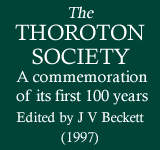Conclusion
At the beginning of its centenary year the Thoroton Society has more than 500 members. It still runs a flourishing lecture, excursion and publications programme and, as such, continues to fulfil the objectives laid down by its founders in 1897. It is no longer class conscious: members do not need to be elected as they did in the early days, and it is nearly fifty years since a county lady told the secretary that there were now no members whom she wished to know! Members join from a genuine interest in local history, archaeology and architecture, but by their subscriptions they also support the external work of the Society. It co-operates closely with the Nottingham Civic Society and with individual local history societies, and contributes to the decision making process in planning matters. These were not roles anticipated by the founding fathers; rather, they are tasks the Society has taken on board in the late twentieth century as part of its commitment to the county’s history, archaeology and antiquities.
Other things have, of course, also changed. At the time of the Society’s Diamond Jubilee in 1957 Professor A.C. Wood commented that the membership was becoming progressively older. His personal recollection was that the Society ‘no longer contains so big a proportion of young and middle-aged members as it did before 1939’. Today, he wrote in 1957,
fewer middle aged men and women can spare time and money for the indulgence of antiquarian interests. This is probably emphasized also by the survival of afternoon lectures (a legacy of the war and the black-out) and by the holding of half our meetings and outings on Thursdays – practices which, in the conditions now prevailing, have made it increasingly difficult for many, and especially for men engaged in their professional or business interests, to take part in much of the Society’s activity.[28]
There was, he noted, a need to change with the times. This has happened, and some of Wood’s worst fears have not been realized. After one hundred years of changing fortunes, through two world wars and with numerous changes in both the structure of Nottinghamshire and of British society more generally, the Thoroton Society continues to thrive. We trust that it will go on to play an important part in the cultural life of Nottinghamshire into the twenty-first century, and into its own second century.
